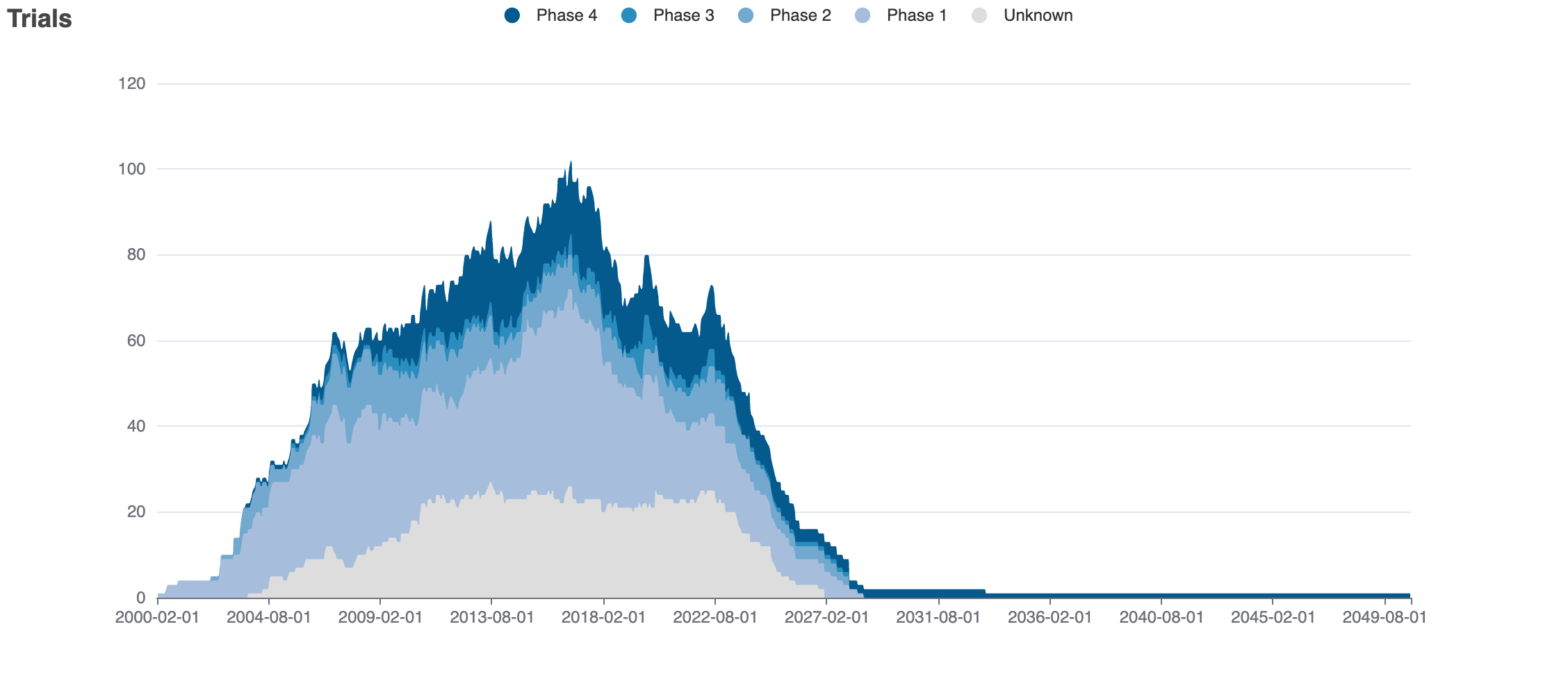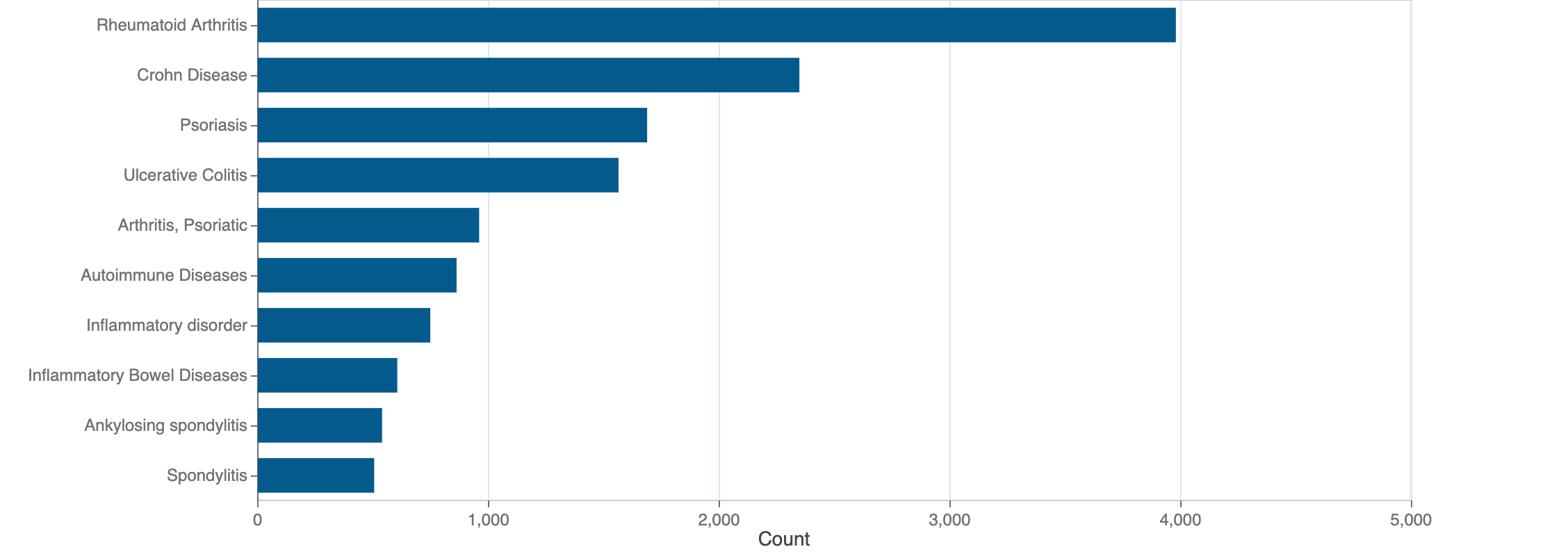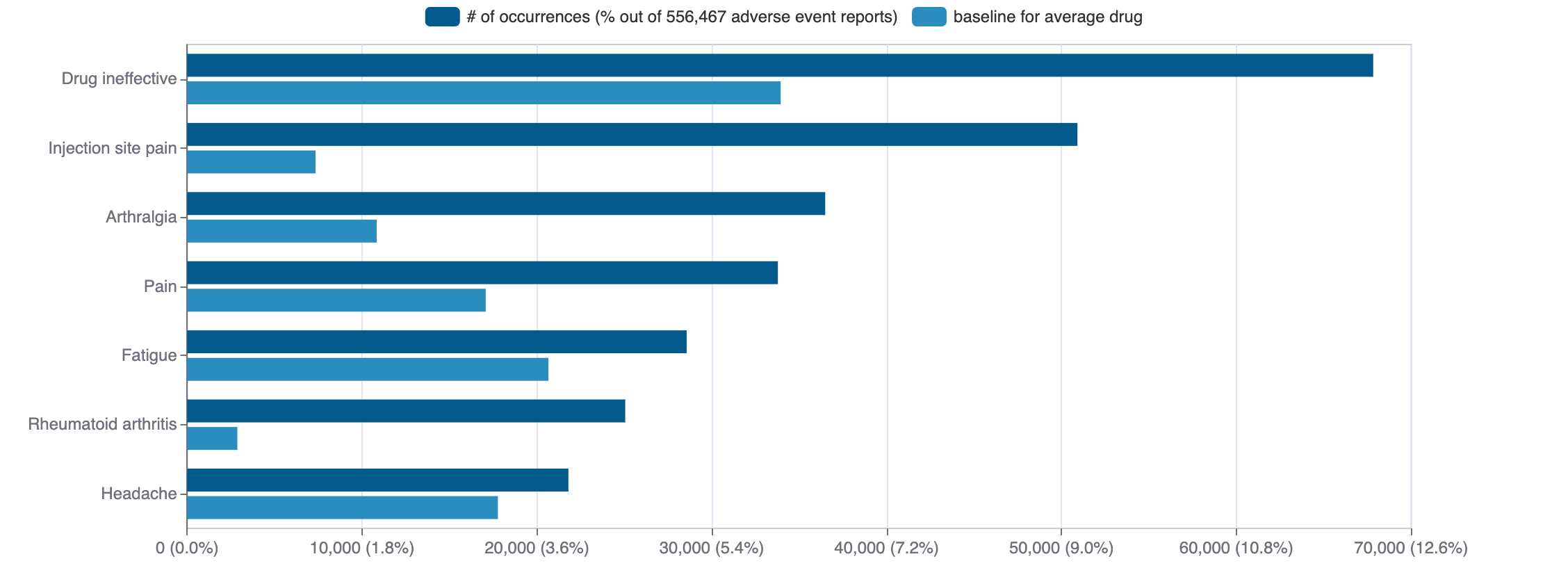Haloperidol decanoate
Haldol, Haloperidol (haloperidol decanoate) is a small molecule pharmaceutical. Haloperidol decanoate was first approved as Haldol on 1982-01-01. It is used to treat child behavior disorders, psychotic disorders, schizophrenia, schizophrenia spectrum and other psychotic disorders, and substance withdrawal syndrome amongst others in the USA. The pharmaceutical is active against 5-hydroxytryptamine receptor 2A, D(4) dopamine receptor, D(3) dopamine receptor, and D(2) dopamine receptor. In addition, it is known to target 5-hydroxytryptamine receptor 1A, 5-hydroxytryptamine receptor 2B, 5-hydroxytryptamine receptor 7, histamine H1 receptor, D(1A) dopamine receptor, 5-hydroxytryptamine receptor 1D, D(1B) dopamine receptor, voltage-gated delayed rectifier potassium channel KCNH1; potassium voltage-gated channel subfamily H member 1, and G protein-activated inward rectifier potassium channel 2.
Download report
Favorite
Events Timeline
Commercial
Clinical
Drug
Target
Variants
Financial
Trends
Safety
Events Timeline
5D
1M
3M
6M
YTD
1Y
2Y
5Y
Max
Events
FDA approval date
EMA approval date
Patent expiration date
Study first post date
Last update post date
Start date
Primary completion date
Completion date
Results first post date

Mock data
Subscribe for the real data
Subscribe for the real data
Commercial
Trade Name
FDA
EMA
Haloperidol decanoate (discontinued: Haldol, Haloperidol decanoate)
Drug Products
FDA
EMA
New Drug Application (NDA)
New Drug Application (NDA)
Abbreviated New Drug Application (ANDA)
Abbreviated New Drug Application (ANDA)
Haloperidol decanoate
Tradename | Company | Number | Date | Products |
|---|---|---|---|---|
| HALDOL | Johnson & Johnson | N-018701 DISCN | 1986-01-14 | 2 products, RLD |
Hide discontinued
Labels
FDA
EMA
Brand Name | Status | Last Update |
|---|---|---|
| haldol decanoate | New Drug Application | 2025-11-11 |
| haloperidol decanoate | ANDA | 2026-01-28 |
Indications
FDA
EMA
Agency Specific
FDA
EMA
No data
Patent Expiration
No data
HCPCS
Code | Description |
|---|---|
| J1631 | Injection, haloperidol decanoate, per 50 mg |
Clinical
Clinical Trials
194 clinical trials
View more details

Mock data
Subscribe for the real data
Subscribe for the real data
Indications Phases 4
Indication | MeSH | Ontology | ICD-10 | Ph 1 | Ph 2 | Ph 3 | Ph 4 | Other | Total |
|---|---|---|---|---|---|---|---|---|---|
| Schizophrenia | D012559 | EFO_0000692 | F20 | 1 | 5 | 12 | 24 | 18 | 58 |
| Delirium | D003693 | — | R41.0 | — | 9 | 17 | 9 | 7 | 38 |
| Psychotic disorders | D011618 | — | F20.81 | 1 | 2 | 11 | 10 | 4 | 27 |
| Psychomotor agitation | D011595 | — | — | — | 2 | 8 | 9 | 7 | 25 |
| Vomiting | D014839 | — | R11.1 | 1 | — | 3 | 5 | 4 | 13 |
| Mental disorders | D001523 | EFO_0000677 | F91.9 | — | 2 | 7 | 3 | 2 | 13 |
| Nausea | D009325 | — | R11.0 | 1 | — | 1 | 5 | 4 | 11 |
| Bipolar disorder | D001714 | EFO_0000289 | F30.9 | — | 1 | 4 | 1 | 3 | 9 |
| Neoplasms | D009369 | — | C80 | — | 3 | 4 | 1 | 1 | 7 |
| Emergencies | D004630 | — | — | — | 1 | 1 | 4 | 1 | 7 |
Show 35 more
Indications Phases 3
Indication | MeSH | Ontology | ICD-10 | Ph 1 | Ph 2 | Ph 3 | Ph 4 | Other | Total |
|---|---|---|---|---|---|---|---|---|---|
| Recurrence | D012008 | — | — | — | 3 | 2 | — | 1 | 4 |
| Critical illness | D016638 | — | — | — | 1 | 1 | — | 2 | 4 |
| Hyperkinesis | D006948 | — | — | — | — | 2 | — | 1 | 3 |
| Anesthesia | D000758 | — | — | — | — | 1 | — | 1 | 2 |
| Dementia | D003704 | EFO_0003862 | F03 | — | — | 2 | — | — | 2 |
| Medication adherence | D055118 | EFO_0006344 | — | — | — | 1 | — | 1 | 2 |
| Hypokinesia | D018476 | — | — | — | — | 2 | — | — | 2 |
| Epilepsy | D004827 | EFO_0000474 | G40.9 | — | 1 | 1 | — | 1 | 2 |
| Heart arrest | D006323 | EFO_0009492 | I46 | — | — | 1 | — | 1 | 2 |
| Intellectual disability | D008607 | EFO_0003847 | F73 | — | 1 | 1 | — | — | 2 |
Show 24 more
Indications Phases 2
Indication | MeSH | Ontology | ICD-10 | Ph 1 | Ph 2 | Ph 3 | Ph 4 | Other | Total |
|---|---|---|---|---|---|---|---|---|---|
| Artificial respiration | D012121 | — | — | — | 1 | — | — | 1 | 2 |
| Movement disorders | D009069 | EFO_0004280 | G25 | — | 1 | — | — | 1 | 2 |
| Ovarian neoplasms | D010051 | EFO_0003893 | C56 | 1 | 1 | — | — | — | 1 |
| Fallopian tube neoplasms | D005185 | — | — | 1 | 1 | — | — | — | 1 |
| Peritoneal neoplasms | D010534 | — | — | 1 | 1 | — | — | — | 1 |
| Intestinal obstruction | D007415 | — | K56.60 | 1 | 1 | — | — | — | 1 |
| Critical care | D003422 | — | — | — | 1 | — | — | — | 1 |
| Ventilator weaning | D015300 | — | — | — | 1 | — | — | — | 1 |
| Gambling | D005715 | EFO_1001926 | F63.0 | — | 1 | — | — | — | 1 |
| Drug overdose | D062787 | — | — | — | 1 | — | — | — | 1 |
Show 8 more
Indications Phases 1
Indication | MeSH | Ontology | ICD-10 | Ph 1 | Ph 2 | Ph 3 | Ph 4 | Other | Total |
|---|---|---|---|---|---|---|---|---|---|
| Healthy volunteers/patients | — | — | — | 2 | — | — | — | 1 | 3 |
| Obesity | D009765 | EFO_0001073 | E66.9 | 1 | — | — | — | 1 | 2 |
| Therapeutic equivalency | D013810 | — | — | 2 | — | — | — | — | 2 |
| Placebos | D010919 | — | — | 1 | — | — | — | — | 1 |
| Body weight | D001835 | EFO_0004338 | — | 1 | — | — | — | — | 1 |
| Weight gain | D015430 | — | — | 1 | — | — | — | — | 1 |
| Pharmacogenomic testing | D000071185 | — | — | 1 | — | — | — | — | 1 |
| Huntington disease | D006816 | Orphanet_399 | G10 | 1 | — | — | — | — | 1 |
| Malnutrition | D044342 | EFO_0008572 | E40-E46 | 1 | — | — | — | — | 1 |
| Tobacco use disorder | D014029 | — | F17 | 1 | — | — | — | — | 1 |
Indications Without Phase
Indication | MeSH | Ontology | ICD-10 | Ph 1 | Ph 2 | Ph 3 | Ph 4 | Other | Total |
|---|---|---|---|---|---|---|---|---|---|
| Long qt syndrome | D008133 | HP_0001657 | I45.81 | — | — | — | — | 2 | 2 |
| Metabolic syndrome | D024821 | EFO_0000195 | E88.810 | — | — | — | — | 2 | 2 |
| Dyslipidemias | D050171 | — | — | — | — | — | — | 2 | 2 |
| Insulin resistance | D007333 | EFO_0002614 | E88.819 | — | — | — | — | 2 | 2 |
| Torsades de pointes | D016171 | EFO_0005307 | I47.21 | — | — | — | — | 1 | 1 |
| Stroke | D020521 | EFO_0000712 | I63.9 | — | — | — | — | 1 | 1 |
| Drug-related side effects and adverse reactions | D064420 | — | T88.7 | — | — | — | — | 1 | 1 |
| Drug interactions | D004347 | — | — | — | — | — | — | 1 | 1 |
| Female genital diseases | D005831 | EFO_0009549 | N85 | — | — | — | — | 1 | 1 |
| Type 2 diabetes mellitus | D003924 | EFO_0001360 | E11 | — | — | — | — | 1 | 1 |
Show 63 more
Epidemiology
Epidemiological information for investigational and approved indications
View more details
Drug
General
| Drug common name | Haloperidol decanoate |
| INN | haloperidol |
| Description | Haloperidol decanoate is an organic molecular entity. |
| Classification | Small molecule |
| Drug class | antipsychotics (haloperidol type) |
| Image (chem structure or protein) |  |
| Structure (InChI/SMILES or Protein Sequence) | CCCCCCCCCC(=O)OC1(c2ccc(Cl)cc2)CCN(CCCC(=O)c2ccc(F)cc2)CC1 |
Identifiers
| PDB | — |
| CAS-ID | 74050-97-8 |
| RxCUI | — |
| ChEMBL ID | CHEMBL1200986 |
| ChEBI ID | — |
| PubChem CID | 52919 |
| DrugBank | DBSALT001195 |
| UNII ID | J6292F8L3D (ChemIDplus, GSRS) |
Target
Agency Approved
No data
Alternate
KCNH1
KCNH1
Organism
Homo sapiens
Gene name
KCNH1
Gene synonyms
EAG, EAG1
NCBI Gene ID
Protein name
potassium voltage-gated channel subfamily H member 1
Protein synonyms
EAG channel 1, ether-a-go-go 1, Ether-a-go-go potassium channel 1, ether-a-go-go, Drosophila, homolog of, h-eag, hEAG1, potassium channel, voltage gated eag related subfamily H, member 1, potassium voltage-gated channel, subfamily H (eag-related), member 1, Voltage-gated potassium channel subunit Kv10.1
Uniprot ID
Mouse ortholog
Kcnh1 (16510)
potassium voltage-gated channel subfamily H member 1 (Q60603)
Variants
No data
Financial
No data
Trends
PubMed Central
Top Terms for Disease or Syndrome:

Mock data
Subscribe for the real data
Subscribe for the real data
Additional graphs summarizing 22 documents
View more details
Safety
Black-box Warning
Black-box warning for: Haldol decanoate, Haloperidol decanoate
Adverse Events
Top Adverse Reactions

Mock data
Subscribe for the real data
Subscribe for the real data
2,784 adverse events reported
View more details
© 2020-2025 Collaborative Drug Discovery Inc. (CDD) | Terms of Use